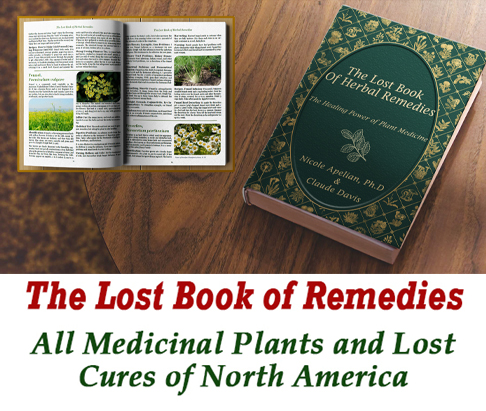Cottonwood bud oil is very effective for relieving pain and inflammation in swollen joints, carpal tunnel and muscles. Massage the oil or salve into the affected area 3x/day.
You'll find 800+ beneficial plants and remedies in "The Lost Book of Herbal Remedies". It includes recipes of tinctures, teas, decoctions, essential oils, syrups, salves, poultices, infusions and many other natural remedies that our grandparents used for centuries. What's also special about this book is that it has between 2 and 4 high definition, color pictures for each plant and detailed identification guidelines to make sure you've got the right plant.
The most powerful remedies growing in your state
 When expectorant and
When expectorant and emollient liquors are indicated?
The most effective cough teas.
Coughing is a defense mechanism of the body, which is why it doesn't always have to be stopped.
Medicinal herbal teas are recommended based on what we are aiming for: to stimulate expectoration
or to stop coughing. Precisely because they are not medicines, it is advisable to use them on the
recommendation of a doctor.
Medicinal herbal teas are recommended based on what we are aiming for: to stimulate expectoration
or to stop coughing. Precisely because they are not medicines, it is advisable to use them on the
recommendation of a doctor.
However, it is good to know how they work and how we can enjoy a little comfort when using them.
"Not all medicinal plants work in the same way. Depending on the type of cough that is addressed,
they are divided into emollient plants (they are rich in volatile oils, useful for the irritant phase, and
the infusions or decoctions prepared from them are hot, preferably sweetened with honey) and
expectorant plants, for the coughing phase) "explains the phytotherapy specialist.
they are divided into emollient plants (they are rich in volatile oils, useful for the irritant phase, and
the infusions or decoctions prepared from them are hot, preferably sweetened with honey) and
expectorant plants, for the coughing phase) "explains the phytotherapy specialist.
The 3 plants you need to throw in your shopping cart to fight coronavirus
Emollient teas
From the first category, the specialist recommends the following plants for the preparation of teas:
Candle (Flores Verbasci) - the infusion is prepared from a teaspoon of flowers to a cup of water.
Drink gradually, during the day. The treatment lasts two to three days.
Field Flea (Flores Rhoeados) - the infusion is prepared from a teaspoon to a cup of water; drinkDrink gradually, during the day. The treatment lasts two to three days.
the whole fragmented amount in a day.
Cultivated Nalba (Flores et Florium Malvae) and Large Nalba (Flores et Radix Althaeae)
an infusion (a teaspoonful in a cup of water) is prepared from flowers and leaves. Drink two cups a
day.
From the roots a cold macerate is prepared(one teaspoonful in a glass of cold water for 30 minutes,
to which is then added a tip of baking soda); drink gradually during the day.
day.
From the roots a cold macerate is prepared(one teaspoonful in a glass of cold water for 30 minutes,
to which is then added a tip of baking soda); drink gradually during the day.
Potbalul (Flores et Folium Farfarae) - the infusion is prepared from one to two teaspoons per
cup of water;
drink two to three cups a day.
cup of water;
drink two to three cups a day.
Tea (Flores Tiliae) also has expectorant properties. The infusion is prepared from one teaspoon - two,
to a cup of water. Drink two to three cups a day.
to a cup of water. Drink two to three cups a day.
o infuse for 10 minutes. Drink 3-4 cups a day in case of colds or other respiratory conditions.
Pătlagina (Folium Plantaginis) - the infusion is prepared from a tablespoon of dried plant in a cup of water;
drink gr
drink gr
Wild thyme - tea is prepared from a teaspoon of dried herbs added to 250 ml boiling water.
Allow tadually over the course of a day.
Allow tadually over the course of a day.
Expectorant teas
From the category of expectorant plants, the specialist in phytotherapy recommends those for:
Pine buds (Turiones Pini) - infusion from a teaspoon to a cup of water. Drinking two or three cups a day.
Eucalyptus - the infusion is prepared from a teaspoon of leaves, to a cup of boiling water. It clears the airways and
fluidises the secretions. It consumes two to three cups of tea a day.
fluidises the secretions. It consumes two to three cups of tea a day.
Basil - the tea in this plant has antibiotic, antimicrobial, antitussive and expectorant action and is also
a very good soothing agent.
The infusion is prepared from a teaspoon of basil, to 200 ml of boiled water - drink 3 lukewarm basil teas a day,
after the main meals,
preferably one at night, at bedtime.
a very good soothing agent.
The infusion is prepared from a teaspoon of basil, to 200 ml of boiled water - drink 3 lukewarm basil teas a day,
after the main meals,
preferably one at night, at bedtime.
Cuckoo Ciuboţica (Flores et Radix Primulae) - the infusion of flowers is prepared from one or two teaspoons,
to a cup of water.
Also indicated is the root decoction (to which is added a tip of baking soda). Drinking two or three cups a day.
to a cup of water.
Also indicated is the root decoction (to which is added a tip of baking soda). Drinking two or three cups a day.
Dosages are indicative. For children, pregnant women and breastfeeding women, the preparations are given
only at the doctor's recommendation
Discover the Forgotten Power of Plants with Dr. Nicole Apelian
only at the doctor's recommendation
Discover the Forgotten Power of Plants with Dr. Nicole Apelian
